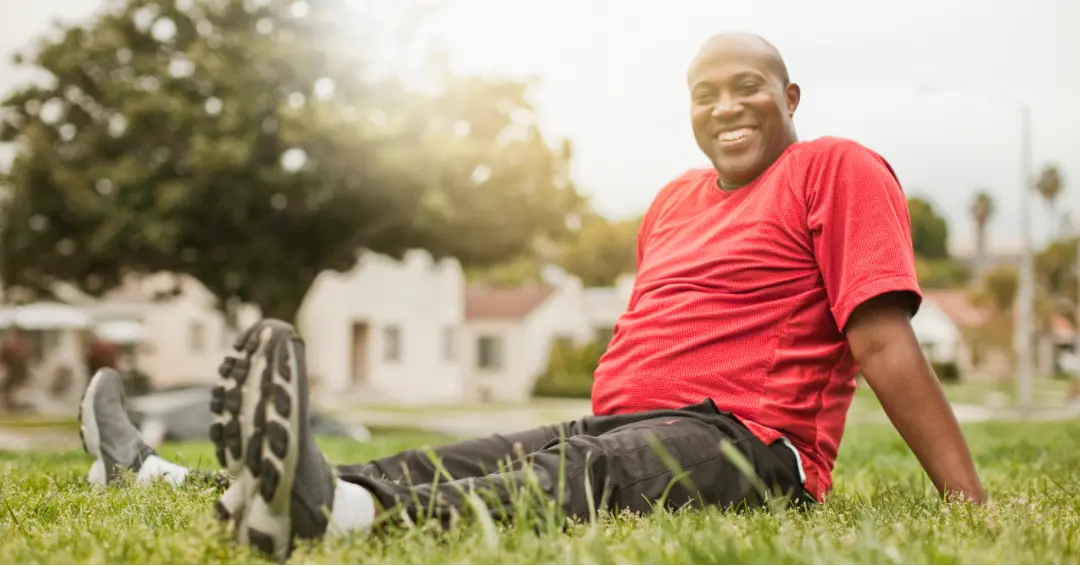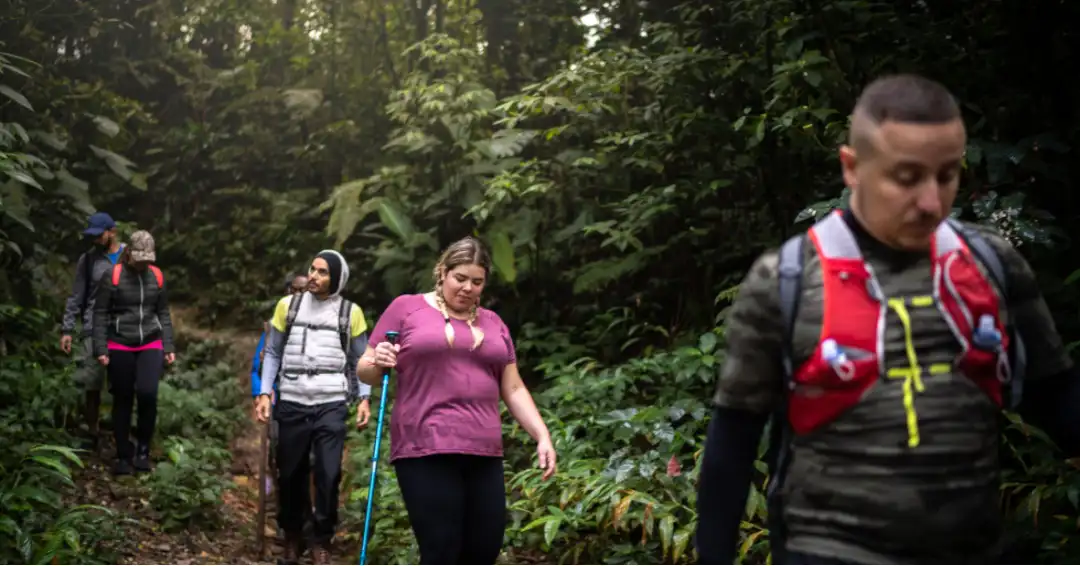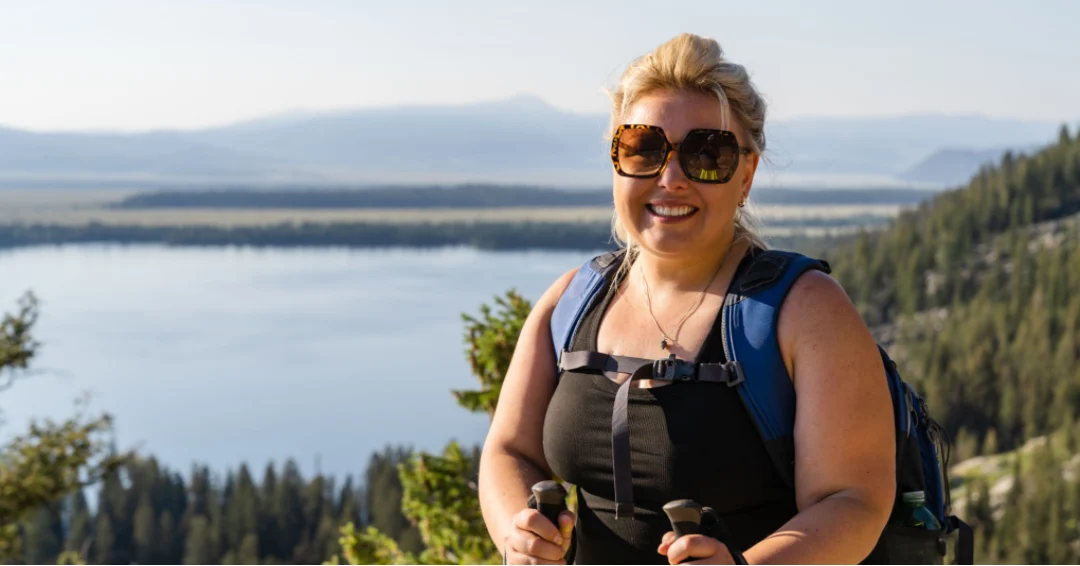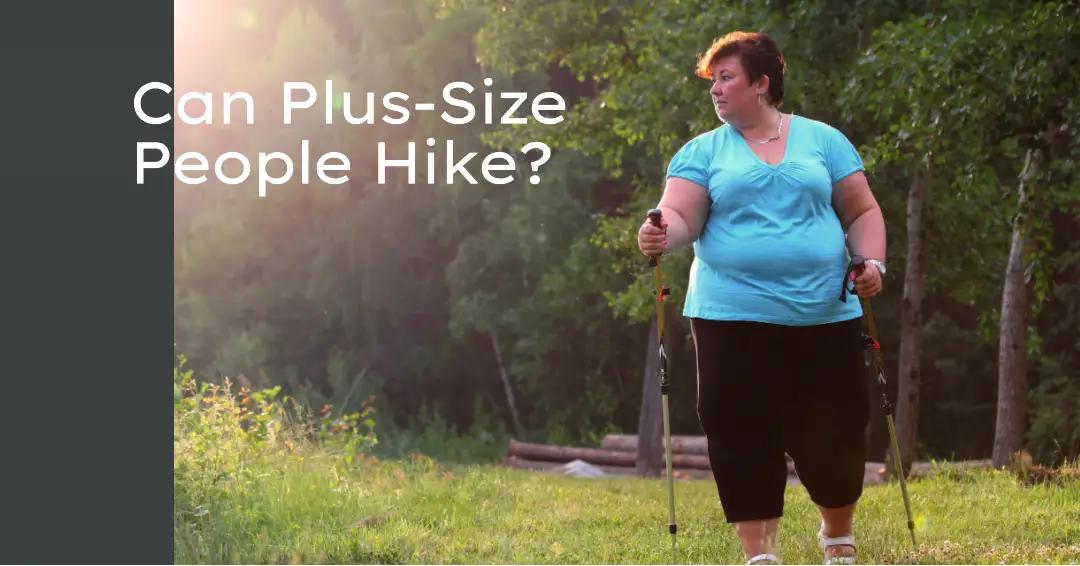Table of Contents
Some links on posts are affiliate links and will earn us a commission from qualifying purchases
Are you an overweight hiker? It can be daunting taking those first steps, but there is hope! Hiking isn’t just for people with average or athletic builds. You too can challenge yourself and explore the great outdoors. With appropriate gear and some extra safety tips, plus-size hikers can get out on trails and enjoy the same incredible experiences as anyone else — sometimes even better ones. Here are a few hints to set you up for success on your next adventure!
Can Plus-Size People Hike?
The answer is a resounding YES! Plus-size individuals can and should enjoy the many benefits of hiking and outdoor activities. Hiking is a fantastic way to experience nature, appreciate scenic views, and positively impact your physical and mental health. Despite social standards and prejudices surrounding outdoor activities, hiking can be an incredibly rewarding and empowering experience for all body types.
Definition of plus-size and overweight individuals
First, it is vital to define what “plus-size” or “overweight” means to be clear. These terms typically refer to individuals whose body mass index (BMI) is above the normal range for their height and weight.
While BMI is not a perfect measure of health, it can provide a useful starting point for understanding the potential risks associated with being overweight or obese. Research shows that having a high BMI is often correlated with an increased risk of developing health problems such as heart disease, Type 2 diabetes, and certain cancers.
Thus, it’s crucial to be conscious of one’s BMI and to make healthy choices every day to maintain a healthy weight and reduce the risk of health complications.
Prejudices and social standards surrounding outdoor activities
Outdoor activities like hiking are often surrounded by prejudices and social standards, that unfortunately dissuade people from trying them out.
For plus-size individuals, the fear of exclusion or judgment can be a major deterrent. However, it’s important to remember that everyone deserves to experience the benefits of the great outdoors, regardless of their size or shape.
The good news is that the outdoor industry is becoming increasingly inclusive, with more and more companies offering a range of hiking gear that suits people of all sizes. By embracing diversity and inclusivity, we can make the outdoors more accessible to everyone and ensure that all individuals can enjoy the freedom and beauty of nature, no matter who they are.
Health Benefits of Hiking for Overweight Individuals
Before embarking on any new exercise regime, including hiking, it’s important to have an open and honest conversation with your doctor. This is particularly crucial if you have any underlying health conditions that may affect your ability to hike safely.
Once you have been given the green light, start with short and easy hikes on flat terrain to build up your endurance and lower body strength. You could try walking on a nature trail, or even through your local park.
As you become more comfortable and proficient, you can gradually increase the difficulty level of the trails you tackle. Consider incorporating uphill climbs and varying terrain to continually challenge yourself.
Always remember to stay hydrated, dress appropriately for the weather conditions, and take breaks as needed to avoid exhaustion and stay safe on the trail.
Cardiovascular benefits
Hiking, a perfect combination of exercise and adventure, is an excellent form of cardiovascular workout that can greatly benefit overall health and well-being. It can get the heart pumping, increase blood flow throughout the body, and help to improve heart health by strengthening the heart muscle.
Furthermore, it lowers blood pressure and reduces the risk of heart disease and stroke, making it a fantastic way to keep your heart healthy.
Additionally, hiking is a low-impact activity that imposes less stress on joints compared to other high-impact exercises such as running and aerobics.
Choosing hiking as a form of physical exercise not only leads to better physical health but also provides a mental refreshment, boosting mood, and reducing stress levels.
Weight Loss and Management
For those struggling to manage their weight, hiking offers a fantastic means of support. In addition to burning calories and initiating an increased metabolism, the terrain used in hiking acts as a resistance force, allowing you to build lean muscle mass over time.
This new muscle can then help to boost your resting metabolic rate, causing you to burn more calories throughout the day even when you aren’t actively exercising.
Plus, hiking offers an enjoyable and rewarding form of outdoor activity, making it a great option for those looking to escape the confines of a traditional gym setting.
Improving Mental Health and Well-being
Hiking can have significant mental health benefits for overweight individuals. It can help to reduce stress and anxiety, improve mood and self-esteem, and promote overall feelings of well-being. Spending time in nature has been shown to have a calming effect on the mind and body, and hiking can help to promote mindfulness and a sense of connection to the natural world.
Overall, hiking is a great way for overweight individuals to improve their physical and mental health, manage weight, and enjoy the great outdoors.

Medical Considerations for Overweight Hikers:
Before beginning any physical activity, it is important for overweight hikers to consider their medical history and current health status.
Overweight individuals may be at a higher risk for certain medical conditions such as heart disease, diabetes, and joint pain. Therefore, it is recommended that they consult with a doctor before starting a hiking regime.
Medical Conditions and Precautions:
Individuals with pre-existing medical conditions, such as asthma, high blood pressure, or heart problems, should be aware of their condition before heading out on a hike. Taking necessary precautions can help make the experience both safe and enjoyable.
It is important to bring any necessary medication, such as an inhaler, and to inform any hiking companions of the condition in case of an emergency.
Additionally, it may be helpful to plan a shorter and less strenuous hike as a way to gradually acclimate to the activity and assess how the body responds.
Always remember to listen to your body and take any necessary breaks. By doing so, individuals can mitigate potential risks and focus on enjoying the beauty of the outdoors.
Hiking Safety for Overweight Individuals:
Overweight hikers should be aware of their physical limitations in order to choose a hike that suits their fitness level.
Starting with shorter and easier hikes is recommended, with a gradual progression to hikes with more challenging terrain and longer duration. Hiking with a companion who is familiar with the terrain is a good idea, as they can provide support and assistance if needed.
It is also important to stay hydrated and bring snacks to maintain energy levels. Taking frequent breaks to avoid exhaustion is also recommended, as well as being mindful of the signs and symptoms of heat stroke in hot weather.
Furthermore, appropriate gear like proper footwear and clothing can go a long way in preventing injuries and ensuring comfort on the trail.
Overcoming Obstacles for Plus-Size Hikers
Overcoming obstacles can be a significant challenge for plus-size hikers, which can range from dealing with heavier backpacks to managing the stress on their body.
That being said, it’s important to note that a person’s weight or size should not limit their ability to explore the outdoors.
By focusing on gradual improvement and utilizing the proper equipment and tactics, plus-size hikers can confidently embark on a fulfilling hiking journey.
Building endurance and strength
When overweight individuals take up hiking, one of the key challenges is to build up endurance and strength. Since hiking is a physically demanding activity, it can be tough to sustain the necessary energy levels for an extended period of time.
To overcome this obstacle, one of the most effective methods is to start with short hikes and gradually increase the distance and difficulty levels.
Along with patience, persistence, and consistency in training, the right hiking gear can also make a big difference. If you’re an overweight hiker, it’s important to select footwear and clothing that’s comfortable, durable, and supportive. Additionally, it can be helpful to bring along a lightweight backpack with essentials such as water, snacks, sunscreen, and insect repellent.
By incorporating a structured routine of strength-building exercises and taking the time to prepare properly, it’s possible to overcome the unique challenges that overweight hikers face and gradually build the strength and endurance needed to tackle longer and more difficult trails.
Choosing Appropriate Gear and Footwear
Choosing the right gear and footwear is not only crucial for the comfort and safety of overweight hikers but also plays a significant role in enhancing their overall hiking experience.
A good pair of hiking boots featuring proper arch support and cushioning can reduce foot fatigue and prevent injuries, while breathable and moisture-wicking clothing can offer comfort and prevent skin irritation during prolonged hikes.
Moreover, investing in a well-designed backpack with waist and shoulder straps can distribute weight evenly and help reduce strain on the back and joints, guaranteeing a more comfortable and fulfilling hiking experience.
Chafing Prevention for Overweight Hikers
Chafing can pose a significant problem for overweight hikers on long treks, as excess skin and friction can lead to painful rashes and blisters.
Wearing moisture-wicking attire and avoiding tight-fitting garments can minimize the risk of chafing. Applying petroleum jelly or another suitable lubricant to areas prone to chafing, such as underarms, inner thighs, and around the waistband, can help prevent discomfort.
In addition, overweight hikers should take regular breaks, change into dry clothes if needed, and sprinkle talcum powder, which helps absorb moisture, on the affected areas to prevent moisture buildup.
Taking these precautions can ensure that overweight hikers remain comfortable on their extended outdoor adventures.

Best Trails and Destinations for Overweight Hikers
It is important for overweight hikers to choose trails that are appropriate for their current fitness level, and to take necessary safety precautions before heading out on a hike.
Difficulty levels and elevation considerations
When choosing a trail for hiking, overweight individuals should take into consideration the difficulty level and elevation of the trail. It is important to start with easier and shorter hikes, gradually increasing difficulty and length over time as endurance and strength improve.
Trails with flat terrain and moderate inclines are ideal for beginners, as they provide a good workout without putting too much strain on the body. It is important to avoid trails with steep inclines and uneven terrain until proper strength and endurance are built up.
Trail safety and preparation
Trail safety and preparation are also important considerations for overweight hikers. It is recommended to research the trail beforehand, including the length, terrain, and weather conditions. Hikers should also carry plenty of water, snacks, and any necessary medication or medical supplies.
It is important to also let someone know where you will be hiking and your estimated return time. Additionally, it is recommended to hike with a partner or in a group for added safety.
Tips and Tricks for Overweight Hikers
By following the tips below and gradually building endurance and strength, overweight hikers can enjoy the many benefits of hiking and explore the beauty of nature without feeling held back by their weight.
Setting Realistic Hiking Goals
For overweight individuals who love hiking, it’s crucial to establish achievable goals that are in sync with their current fitness level.
Setting small and manageable targets in the form of easy hikes at first can prove to be beneficial, which can be later increased in difficulty and duration as endurance builds up. This can not only make the hikes more gratifying but can also help in boosting their self-confidence.
Interval Training and Treadmill Walking
Interval training is an excellent technique that boosts cardiovascular fitness, prepares you for hiking, and helps burn calories more efficiently. With high-intensity periods of exercise alternating with rest or low-intensity exercise, interval training creates prolonged calorie burning periods, making it ideal for weight loss and better metabolism.
If you are not able to go outdoors, treadmill walking can be a helpful alternative as it simulates hiking conditions while also building endurance. So, whether you prefer the outdoors or being indoors, there are always ways to prepare for your next hike!
Using Trekking Poles and Proper Stretching Techniques
Trekking poles not only provide the necessary support and stability required while walking on uneven terrains but they also reduce the impact on the knees and legs, allowing you to hike with ease.
Incorporating proper stretching techniques into your routine can also contribute to injury prevention and improve flexibility and range of motion, ultimately ensuring a more rewarding and comfortable hiking experience.
Body Positivity and Empowerment in Hiking
Body positivity and empowerment are important aspects of hiking for individuals of all sizes, and overweight hikers are no exception. Here are some ways in which body positivity can be fostered in the hiking community.
Inclusive hiking communities and resources
There are many inclusive hiking communities and resources available for overweight hikers. These groups provide a supportive environment for individuals of all sizes to connect and share their love of hiking.
They often organize group hikes and provide tips and advice for overcoming the unique challenges that overweight hikers may face. Some examples of such communities include Fat Girls Hiking, an online Body Positive Hiking Club.
Representation in the Outdoor Industry
Representation in the outdoor industry is important not only to promote body positivity and inclusivity, but also as a means of attracting more diversity. The industry has long relied on images of thin, fit individuals, which can be discouraging and alienating for those who do not fit that mould.
But by showcasing overweight hikers, differently-abled climbers, and a myriad of other types of outdoor enthusiasts, we can create a culture of acceptance and celebration of diverse body types. This will not only help more people feel included in the outdoor community, but also inspire more individuals from underrepresented groups to engage in outdoor activities and pursue active lifestyles.
Let’s work together to create a more welcoming and inclusive outdoor industry!
Overweight Hikers’ Experiences and Sharing Their Stories
Sharing stories of overweight hikers and their experiences can help to inspire and empower others. These stories can showcase the joys and challenges of hiking, as well as the physical and mental benefits of being active in nature.
Overweight hikers can share their stories through blogs, social media, and other online platforms, as well as in-person through group hikes and other events.
Overall, promoting body positivity and inclusivity in the hiking community is essential for creating a welcoming and supportive environment for all individuals, regardless of their size or shape.

Conclusion – can plus size people hike?
In conclusion, hiking is an excellent way for plus-size individuals to enjoy the many benefits of outdoor activities. Preparing adequately, selecting appropriate hiking gear and footwear, and choosing suitable hiking trails can enhance your hiking experience significantly. Remember to set realistic hiking goals, stretch regularly, and use trekking poles to improve balance and reduce stress on your joints. Most importantly, enjoy nature without judgment and appreciate the beauty of the great outdoors.
Recent Posts
Does hiking slim thighs? Enjoy nature and shed pounds at the same time!
Are you someone who loves to explore the outdoors and take in all that nature has to offer? Have you been walking for weight loss, but are wondering whether it may have any effect on slimming your...
Walking for Weight Loss: The Benefits of Walking and How to Optimize Your Routine
Maintaining a healthy weight is crucial for our physical and mental well-being. However, with busy schedules and sedentary lifestyles, many people struggle to find the time and motivation to exercise...


